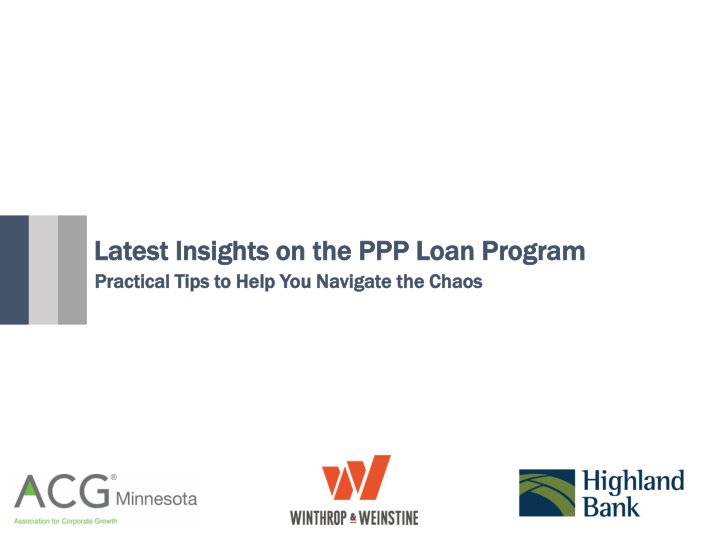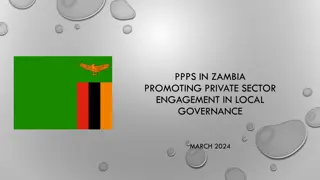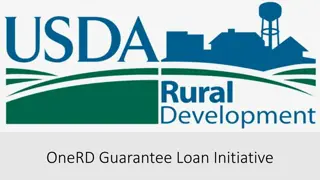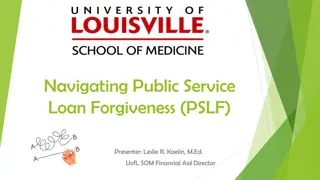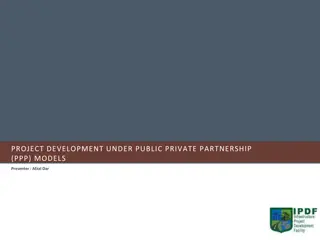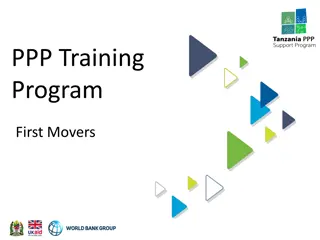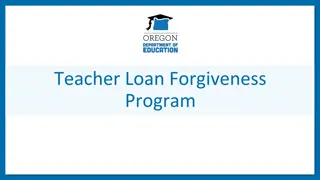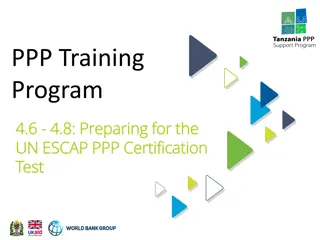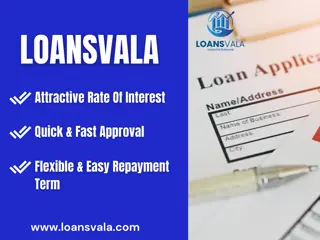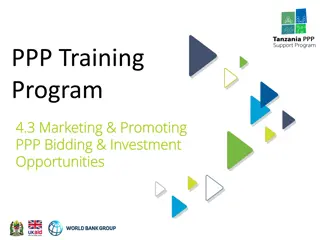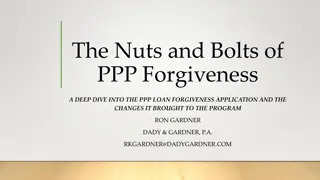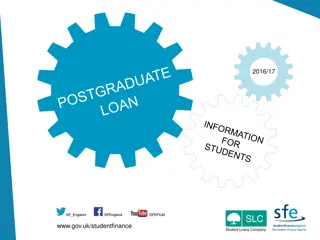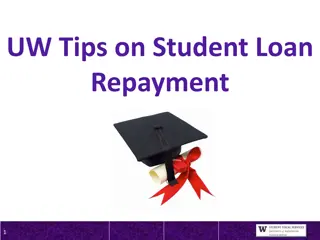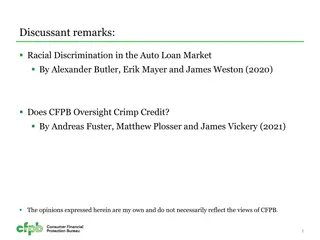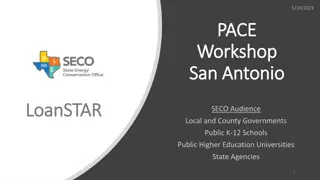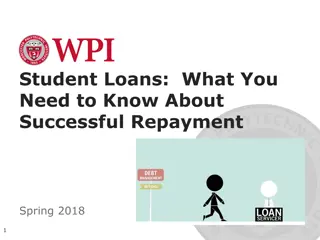Insights on PPP Loan Program and Practical Tips
Practical advice and insights on the PPP Loan Program including eligibility, affiliation rules, and impact on PE-owned companies. Learn about navigating the chaos, sources of frustration, and how to obtain speedy approval and funding.
Download Presentation

Please find below an Image/Link to download the presentation.
The content on the website is provided AS IS for your information and personal use only. It may not be sold, licensed, or shared on other websites without obtaining consent from the author.If you encounter any issues during the download, it is possible that the publisher has removed the file from their server.
You are allowed to download the files provided on this website for personal or commercial use, subject to the condition that they are used lawfully. All files are the property of their respective owners.
The content on the website is provided AS IS for your information and personal use only. It may not be sold, licensed, or shared on other websites without obtaining consent from the author.
E N D
Presentation Transcript
Latest Insights on the PPP Loan Program Latest Insights on the PPP Loan Program Practical Tips to Help You Navigate the Chaos Practical Tips to Help You Navigate the Chaos
For Today Overview of Payroll Protection Program ( PPP ). Practical advice for submitting applications and obtaining speedy approval and loan funding. Sources of frustration for borrowers and lenders. Overview of Emergency Injury Disaster Loan ( EIDL ) loan program. 2
PPP Loans PPP Loans
PPP Launch - A Whirlwind 10 Days Friday, March 27 CARES Act signed into law; establishes PPP. Borrowers scramble to determine eligibility and prepare expected required materials. Banks start to ramp up, expecting unprecedented number of loan applications. Tuesday, March 31 Treasury releases PPP application and 1-page Fact Sheet. Borrowers begin to complete application and submit to banks. Thursday, April 2 Late at night, SBA releases much-anticipated Interim Final Rule and new PPP application. Friday, April 3 Floodgates open. 4
Who Is Eligible? Any business who is considered small by the SBA s size standards. Depending on the industry, this could either be an employee test or a revenue test. Any business with less than 500 employees. Special rules in CARES Act 500 employee limit does not apply to: Restaurants, hotels, or casinos as long as they have <500 employees at each location; Most franchisees; and Businesses who receive financial assistance from an SBIC. Any business with (1) maximum tangible net worth < $15M; and (2) average net income after Federal income taxes < $5M for each of the last two full fiscal years. Independent contractors and sole proprietors. In determining whether a business is eligible, be mindful of the SBA s broad Affiliation Rules (see next slide), which can be a trap for the unwary. 5
Affiliation Rules and Impact on PE-Owned Companies In determining whether a business is small, the SBA looks at the business together with its affiliates. The SBA definition of affiliate is different and generally broader than other typical definitions of that term. In determining whether an affiliation exists, the SBA looks at the totality of the circumstances, considering factors such as common ownership, common management, and substantially similar business interests or relationships. Control may be affirmative or negative, such as the ability to block an action of the board of the directors or prevent a quorum at a board meeting. This makes it challenging for companies that have taken venture capital or private equity investments to be considered small under the SBA rules. SBIC exception is a possible workaround for some PE-owned companies. The PPP application requires a certification, under penalty of perjury, that the business is in fact eligible for the program, including under the affiliation rules. Lenders are not required to make an independent determination of affiliation. 6
Affiliation Rules and Impact on PE-Owned Companies PE Sponsor PortCo A (200 Employees) PortCo B (250 Employees) PortCo C (75 Employees) 7
What Are The Loan Terms? Amount: Up to 2.5x the borrower s average payroll costs, up to a maximum loan amount of $10M. Interest rate: 1.0% Term: 2 years; all payments deferred for at least 6 months. Collateral: No personal guaranty or collateral requirements. Forgiveness: Up to 8 weeks of payroll, mortgage interest, rent, and utility expenses, 75% of which must be payroll costs. Reductions in staffing and employee compensation may reduce amount of forgiveness. 9
How Do I Calculate Average Payroll Costs? INCLUDED Payroll Costs EXCLUDED Payroll Costs Salary Cash Compensation to any employee > $100k [Does not include non-cash compensation like employer contributions to retirement plans, insurance premiums, taxes, etc.] Wages Payments to independent contractors Commissions Payments to non-U.S. residents Paid leave Federal tax withholdings Benefits State and local taxes *** Latest guidance says borrowers can use either previous 12 months or calendar year 2019 as the measurement period Example: Annual payroll costs: $1,500,000 Subtract cash compensation in excess of $100,000: $300,000 Annual qualifying payroll costs: $1,200,000 Average monthly qualifying payroll costs: $100,000 Multiple by 2.5 = $250,000 Maximum loan amount is $250,000 10
How Does the Loan Forgiveness Work? Submit forgiveness application to your lender, including documentation verifying: the number of FTEs you employed during the relevant periods and the compensation that you paid them; and payments of mortgage obligations, rent, and utilities. Lender is supposed to issue a decision on your loan forgiveness within 60 days of receiving the complete application. If the loan has a remaining balance after application of the forgiveness test, the SBA will continue to guarantee it. 11
When Do I Get The Money? Lenders have delegated authority from the SBA to approve and fund the loan (i.e., the SBA does not approve the loan itself). Many lenders are still figuring out their own policies and procedures for completing underwriting and making the loans. Actual funding could take days, if not weeks, from the time the borrower submits an application. Should speed up as banks get more comfortable with the process. Lenders must fund PPP loans with their own liquidity and seek reimbursement later on from the SBA. Can receive expected forgiveness amount after funding the loan, with true-up following actual forgiveness application. Uncollected, non-forgivable portion can be collected from the SBA by enforcing the loan guarantee at maturity. 12
. . . . . . 16
Whats Causing the Chaos? For Borrowers: SBA releases new loan application hours before the program opened; many companies had already submitted the old application. No SBA guidance for several unique situations. Fear that money will run out creates heightened urgency and frustration with the process. Not sure when loans will get funded puts borrowers at risk of closing, creating anxiety for their employees, suppliers, and customers. Many lenders will not take applications from new customers; some lenders are prioritizing gold star customers. 17
Whats Causing the Chaos? For Lenders: Funding and liquidity issues. SBA guidance has been slow, piecemeal, and confusing. Underwriting requirements are unclear. Latest guidance says that lenders should conduct a minimal and good faith review of payroll costs in order to verify the accuracy of the borrower s calculations Too many applications; limited capacity to accept applications from new customers. Technical issues with the SBA s E-Tran system. Substantive questions No SBA guidance on many technical issues, including: Loan structure Are multiple advances permitted? Loan documents SBA forms or lender forms? Cross-default and forbearance issues Can PPP loans be cross-defaulted with existing loans. What if existing loans are already in default? Subordination issues Which loan gets paid first? Collateral issues What if existing security agreement covers all borrower debt? Use PPP loan proceeds as leverage for negotiations/concessions on existing loans? 18
EIDL Program EIDL Program
EIDL Program: Basic Overview General: Preexisting SBA program for small businesses experiencing an economic injury due to an unforeseen disaster. Loans issued directly by U.S. Treasury no third-party lender involvement. Eligibility: Similar to PPP loans. Affiliation rules still apply. Amount: Up to $2M (SBA will determine the loan amount based on the applicant s monthly business expenses and liquidity position). Use of Funds: Fixed debts, payroll, accounts payable, and other bills that could have been paid had the disaster not occurred. Interest rate: 3.75% (2.75% for non-profits). Term: 15 or 30 years, to be determined by the SBA based on repayment ability. Collateral: Personal guarantees and (maybe) pledges of personal collateral required for loans > $200,000. Forgiveness: N/A 20
EIDL Program: Emergency Advances Recognizing that the EIDL approval process can be as long as a month, the CARES Act provides that EIDL applicants can receive an advance of up to $10,000 within 3 days. The applicant will not be required to repay the $10,000 advance, even if the SBA ultimately denies the loan application. We are not aware of any applicants who have actually received their $10,000 advance. 21
Can I Combine a PPP Loan with an EIDL? Generally, a business can apply for loans under both the PPP and the EIDL program but must use the EIDL for a different purpose than the PPP loans. EXAMPLE: Use EIDL for inventory purchases and other trade payables. Use PPP for payroll, rent, interest payments, etc. 22
Questions? Questions? RYAN SCHILDKRAUT RYAN SCHILDKRAUT WINTHROP & WEINSTINE WINTHROP & WEINSTINE SHAREHOLDER CORPORATE/M&A P/ 612.604.6489 E/ rschildkraut@winthrop.com KIM STOREY KIM STOREY HIGHLAND BANK HIGHLAND BANK SR. VICE PRESIDENT SBA LENDING MANAGER P/ 952.858.4590 E/ rschildkraut@winthrop.com
